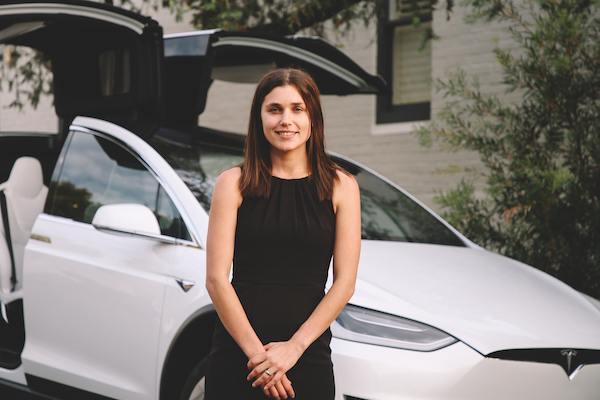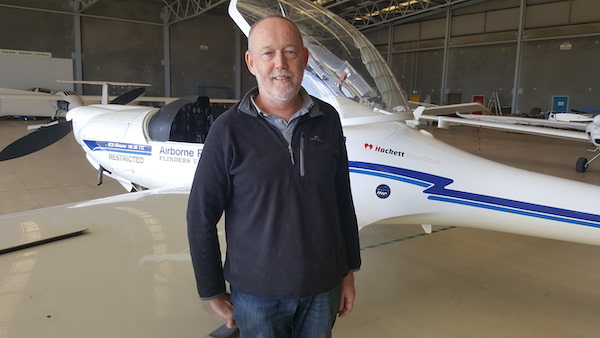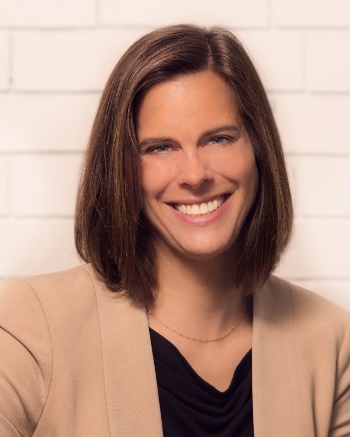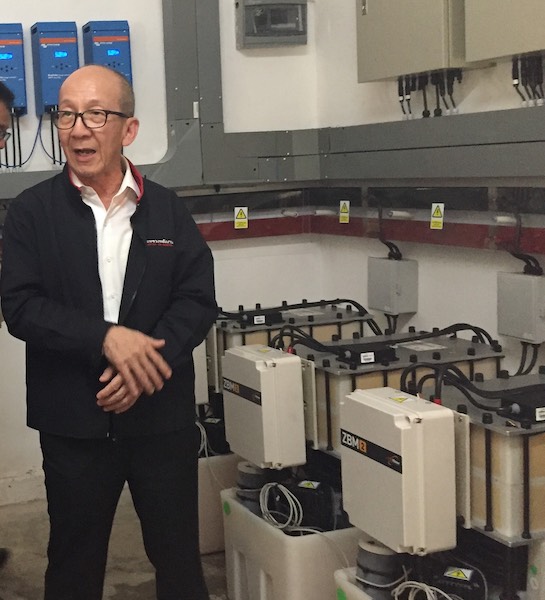Featured News
Newsroom
- Details
- In Simon Hackett
- /
 Evoke founder and CEO Pia PetersonAustralia’s first fleet of chauffeur-driven, zero-emissions cars, Evoke, has launched in Melbourne, providing Victorian customers with the carbon-free transport they have long requested.
Evoke founder and CEO Pia PetersonAustralia’s first fleet of chauffeur-driven, zero-emissions cars, Evoke, has launched in Melbourne, providing Victorian customers with the carbon-free transport they have long requested.
Launched in Sydney in 2015, Evoke operates a fleet of electric cars that can each avoid emitting more than five kilograms of carbon dioxide into the air every time it takes a passenger from the Melbourne CBD to the airport.
Evoke founder and CEO Pia Peterson said the Melbourne launch was due to customer demand. “Melburnians who use our cars in Sydney have long asked us when we would be there,” said Pia. “It is great to now provide them with comfortable emission-free transport at both ends of their journey.
- Details
- In Simon Hackett
- /
 Airborne Research Australia Director Dr Andrew McGrath Philanthropic organisation Hackett Foundation has donated $100,000 to Airborne Research Australia, a not-for-profit Australian research institute that conducts world-leading measurements of climate change.
Airborne Research Australia Director Dr Andrew McGrath Philanthropic organisation Hackett Foundation has donated $100,000 to Airborne Research Australia, a not-for-profit Australian research institute that conducts world-leading measurements of climate change.
Airborne Research Australia (ARA) https://www.airborneresearch.org.au/ operates two purpose-designed single-engine Diamond aircraft equipped with globally unique self-developed or adapted environmental measurement equipment.
With climate change a growing concern globally, and ongoing debate about human contribution to it, precise environmental measurements are vital for a deeper understanding and better-informed policy.
- Details
- In Innovation
- /
 A Queensland-based business with deep energy technology expertise, Davanz, is aiming to accelerate Australia’s innovative application of its rich renewable energy resources.
A Queensland-based business with deep energy technology expertise, Davanz, is aiming to accelerate Australia’s innovative application of its rich renewable energy resources.
Davanz has an impressive client list that includes CSIRO, Woodfordia, Anteo Technologies, H2H Energy, the Queensland Government, the Sunshine Coast Council, and Innovation Centre Sunshine Coast.
Davanz founder Stephanie Moroz said the development and deployment of new energy technologies was a central economic challenge and opportunity for Australia and the world. “Just as fossil fuels powered economic development during the 20th century, renewable energy sources will drive that process during the 21st,” she said.
- Details
- In Redflow
- /
 Thailand Energy Minister Dr Siri Jirapongphan with Redflow batteries at Ban Pha DanRedflow ZBM2 zinc-bromine flow batteries are now storing solar energy to provide a reliable power supply for a remote village in mountainous northern Thailand that has long lacked electricity.
Thailand Energy Minister Dr Siri Jirapongphan with Redflow batteries at Ban Pha DanRedflow ZBM2 zinc-bromine flow batteries are now storing solar energy to provide a reliable power supply for a remote village in mountainous northern Thailand that has long lacked electricity.
In a project backed by the Thai Government, the village of Ban Pha Dan in Lamphun province is using solar cells to harvest energy and a high-performance hybrid battery system, including ZBM2s, to store energy for a village microgrid that is separated from the national electricity distribution network.
Ban Pha Dan, 70km south of the northern Thai city of Chiang Mai, is a small village that has lacked access to electricity because it is surrounded by a wildlife reserve where power poles are forbidden. This microgrid project was initiated by Thailand’s Energy Ministry and the Renewable Energy for Sustainable Association with financial support from the Energy Conservation Promotion Fund.
Thailand’s Energy Minister Dr Siri Jirapongphan visited Ban Pha Dan to inspect the new microgrid and energy storage system in mid-January. Later that month, the Thailand National Energy Policy Council, chaired by Prime Minister Prayut Chan-o-cha, approved Thailand’s Power Development Plan, which prioritises the development of renewable energy sources for the period 2018-2037. Dr Jirapongphan said that non-fossil energy would account for 35 per cent of total capacity by 2037.
More News...
- “It’s pure, uncut Whitey or nothing at all” (03 February 2019)
- Philip White: "Living proof that Jesus leads straight to acid.” (30 January 2019)
- Redflow wins second South African telco battery sale (27 November 2018)
- Redflow batteries to power Optus mobile tower in Daintree rainforest (26 November 2018)
- Redflow batteries to store renewable energy for new children’s centres in Melbourne’s east (23 November 2018)
- Vectra delivers affordable access to IBM QRadar SIEM (06 November 2018)
- Redflow supplies batteries for South African mobile phone towers (22 October 2018)
- Religion scholar to remind SA that religious education divides (22 October 2018)
- Redflow Board gains manufacturing expertise (19 October 2018)
- Redflow recruits energy storage veteran to grow sales (02 October 2018)
Off the Cuff

Simon Hackett speaks about Formula E racing on ABC Radio Adelaide
Australian renewable energy investor Simon Hackett last week spoke to Radio ABC Adelaide's Afternoons host Sonya Feldhoff about the benefits for replacing the cancelled Adelaide 500 motor race with a...
Read more
Seven simple steps for mental health in time of coronavirus
After the summer bushfires, the coronavirus pandemic and associated economic shutdown, “unprecedented” must be a standout favourite for Macquarie Dictionary’s Word of the Year for 2020. For the first time...
Read more
John Harris talks (a bit) about International Albinism Awareness Day on ABC Radio
John Harris, who has the honorary role of PR guy for the Albinism Fellowship of Australia, was interviewed by Peter Goers on the Evenings show of ABC Radio Adelaide on...
Read more
Start-ups are key to the future of everything
Nigel Lake, Executive Chair of global business advisory firm Pottinger, will tell this week's Myriad start-ups festival in Brisbane, running May 16-19, that Australia needs start-ups to protect its prosperity. Pottinger...
Read moreContact
Impress Media Australia
P: +61 8 8431 4000
E: john@impress.com.au
W: www.impress.com.au
Street:
Impress Media Australia
313 Portrush Road,
Norwood SA 5067
Click here for our location
Postal:
Impress Media Australia
Box 95, Kensington Park
South Australia 5068







